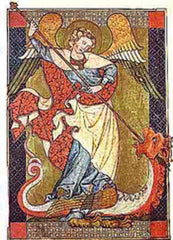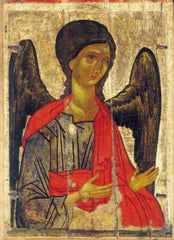As Michaelmas Approaches..... September 22 2015
Why Do Waldorf Schools Celebrate Michaelmas?
Excerpt from "Waldorf Journal Project #15 - Michaelmas"
Summer’s haze vanishes when the clear skies and crisp air of September arrive. This is the time we establish our rhythms for the year; in many respects it is more of a New Year than January 1. It is a time of separation and individualization. The cool, pristine air wakes us from our summer daze and our thinking becomes more precise. With the beginning of school, we send our young ones off with memories of our own education etched indelibly into our own personalities. It is a time when we naturally think back upon our own lives.

The autumn is a rare time. In many parts of North America, the trees are ablaze with splendid color— the scarlet maples of New England, the twittering yellow aspens of the Rocky Mountains, and the orange sumac of the South are but a few examples. The evening skies come alive as meteor showers streak across the dark canopy like blazing arrows. The remnants of this cosmic metallic presence is unknowingly absorbed into our blood from the very air we breathe, invigorating our blood with its homeopathic qualities of iron. Darkness starts to wrap around us and we are moved inside to the comfort of our homes. Our thought life also goes inward. The dreamy mood of summer is replaced by a new vigor that seems to aid us in our tasks. Beyond external observation, what does all of this mean?
An ancient intuitive wisdom placed a festival at each of the four turning points of the solar year. In the autumn this festival was named after a mythological figure, the archangel Michael, the heavenly warrior. The name Michael is Hebrew, and its meaning is a question: “Who is like God?” Legend tells that Michael, along with Gabriel, Uriel and Raphael, was sent out into the cosmos by God to seek a name for man. With sublime spirit-power, Michael, as the messenger of God, proclaimed man’s earthly name: “Adam.”
There are many other legends of Michael, the most notable being of his confrontation in heaven with the rebellious angels, led by Lucifer, who sought to overthrow God. The forces of Michael cast them out of heaven and held them in control in their earthly form as dragons. Michael did not slay the leading dragon, but through his inner forces was able to hold it within his control, at the tip of his spear.
If we examine this story, we can begin to find the meaning of Michaelmas and the task of Michael. The dragon is not an external reality, but rather lives within all humankind, represented by cold, dead, rationalistic and pragmatic thinking. It is alive within every mortal as a potentially evil force. Michael’s message to humanity is not to try to slay the dragon within ourselves, for we would not live in freedom if we did, but rather to overcome it with consciousness. It is the consciousness in our thinking which calls for exactitude and selflessness, as well as the strength of will needed to follow a moral path in life. Michaelmas is a festival of inner strength and initiative. It is a time when our higher being can conquer anxiety and fear, for it is the task of Michael to awaken mankind to the eternal within.

The backdrop for the drama of history is the struggle between the powers that strive for the forces of Goodness against those that struggle for the purpose of Evil. It is within each individual on earth that this drama is enacted. Mythology can be thought of as a psychological healer for mankind; it gives one courage through its images of Good conquering Evil. What does this old picture have to do with us in our comfortable modern communities?
We live in an age of individuality and personal freedom. Our society offers us a multitude of choices. This often puts great stress on the young as they seek to find a direction in their lives. The prevalent “Me” generation often sees only the first roughshod steps toward becoming free individuals, without recognizing the more evolved counterparts of responsibility and love.
What is the picture of society that stands behind our drive toward free individuality? We are struggling a midst the unsettling realities of the crumbling forms of social order — our justice system, government, marriage, schools, churches — all once rocks of stability to mankind now shift treacherously under the feet like slippery sand. We must fend for ourselves. No longer can we be sure what we hear is truthful. Out of our own initiative and strength we must give direction to our lives.
The “new forms” we create and the discernment of what is really “true” both in the present and in the past, lie fully on our own individual shoulders. In the creation of “new festivals” there exists a powerful mystery involving the unfolding of community-building and spirit-focusing.
In the legend of Michael, we find he offers four gifts: strength, courage, the will to do deeds, and love, to those who are willing to undertake self-transformation and look towards that which is divine in every human being. Both the transformation and the battle with the dragon are uniquely individual; they reside within our powers of thought, and we are the only ones to have access to them.

At Waldorf schools circling the earth, the children hear stories and legends of Michael. Then, on or around September 29, the teachers in many of our schools lead their students out onto the fields, where they see an enactment of Michael’s battle with the dragon. Then each and every child participates in feats of skill and courage and a pageant unfolds. This event is often followed by a large picnic with all families invited. This “new festival” is involved with the awakening of the “will” for rightful deeds.
